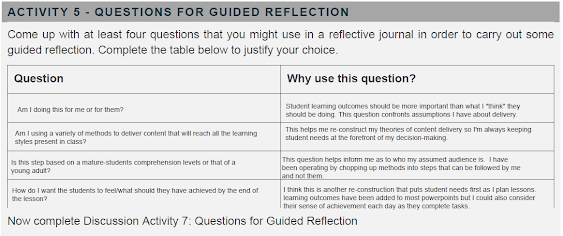Jovancic, N. (2019,
August 6). Student
Satisfaction Survey: 24 Question Samples + Template. Lead Quizzes. https://www.leadquizzes.com/blog/student-satisfaction-survey/
I'm putting together two surveys this morning, one for a student intern and one for the client, to gauge teaching effectiveness of student interns during supervised projects. The sample size will be one person each. This exercise is meant to get used to soliciting feedback and critically reflecting on our teaching practice. The above website has sample questions that I will use to supplement the ones that I've already thought of:
student intern survey questions by Traci
My skills were valued on this
project
I learned new things from my
supervisor
I needed more one-on-one time with
my supervisor.
I needed less one-on-one time with
my supervisor.
I got to try many new things on this project.
Student intern questions from (Puget Sound 2021)
- 5. I bring these three skills from my internship:
- From Survey Monkey internship survey
- How well did the job duties you were given match your knowledge and skills?
- How comfortable did you feel with asking questions during your internship?
- How much did you learn during your internship?
- How would you rate your working relationship with your supervisor?
- Were you given constructive feedback?
- I got a template here: http://www.nsHRtoolkit.ca which I am filling out with a focus on training/mentorship/teaching.
Guidance of
the student interns produced a satisfactory result for my project.
I would have
more student interns work on future projects.
I am
satisfied with the ratio of student intern to supervisor work on this project.
The student interns selected to
work on my project were of good or better quality.
I would consider hiring a student
intern after graduation to work for me.
This one is harder to conceptualise: what do I want to know? What's going to help me in future with interns on projects?
The client survey went out and came back super fast so I am now waiting on the intern survey. I have feedback in the form of internal moderation so that's 3 pieces of feedback (with another 3 in the wings if I need them) to analyse for Part B.
Activity 4
1. Reflection should not to be restricted to examining only teciznical skills; it should equally be concerned with the etizical, social, and political context within which teaching occurs;
2. Reflection should not be restricted to teachers reflecting individually upon their teaching’ there needs to be a collective and collaborative dimension to it as well;
3. Reflection is a process that is centrally concerned with challenging the dominant myths, assumptions and hidden message systems, implicit in the way teaching and education are currently organised;
4. Reflection is also fundamentally about creating improvements in educational practice, and the social relationships that underlie those practices;
5. Reflection is founded on the belief that knowledge about teaching is in a tentative and incomplete state, and as such, is continually being modified as a consequence of practice;
6. Reflection occurs best when it begins with the experiences of practitioners as they are assisted in the process of describing, informing, confronting and re-constructing their theories
now choose to focus on one of the following practices.
Positive engagement with learners
• Variety of teaching/training methodologies
• Opportunities for learner interaction
• Programme based on learner needs
using Smyth’s model of Critical Reflection on Classroom Practice, critically reflect on your own practice in that chosen area using a recent teaching/training session. As you reflect, note your thinking under the headings used in the model:
• Describing
Students in multiple classes came back from break with homework partially complete. They were not ready to progress to the next stage so we reviewed the lesson from before break and touched on the next step briefly. The following lesson did not feel like a clean continuation but a constant circle back to explain to each student what they had not grasped in the group lesson.
• Informing
I am working from an assumption that adult learners are self-motivated and when given time off, will use that time to do extra study. I often set students up for failure because I spend most of class lecturing instead of providing a balance between tutorial and practical exploration of the topic. They are then expected to put these ideas into practice outside of class when they could get tutor support and feedback.
• Confronting
I came to be like this because I am work-motivated, I am a workaholic, extra study is how I conducted myself in the BSA, I have trouble taking time off for relaxation and expect the students to be like me.
• Reconstructing.
These ideas come from me finding solace in work when I was 13. It gave me something to talk to people about and was a liferaft for me in a sea of adolescent social awkwardness. I cling to this model because it helps me feel like order is being brought to chaos, that if I don't have students who produce huge results I am not doing my job and will be judged. If I work very very hard then I am good. If I make my students work very very hard then THEY are good.
Evaluate the effectiveness of this model by answering these questions:
How is it different from the standard lesson review?
The standard lesson review does not look at teacher motivations but cut and dried facts with judgement statements: how much time was spent doing x, how many students completed y, what were the end results z. It's formulaic.
How does it support the teacher/trainer to transform their practice to better meet student’s needs?
Reflection asks the teacher to interrogate their basis for decision-making. If they can figure out what assumptions they're teaching from, they can make adjustments that will lead to better results for themselves and their students.


No comments:
Post a Comment